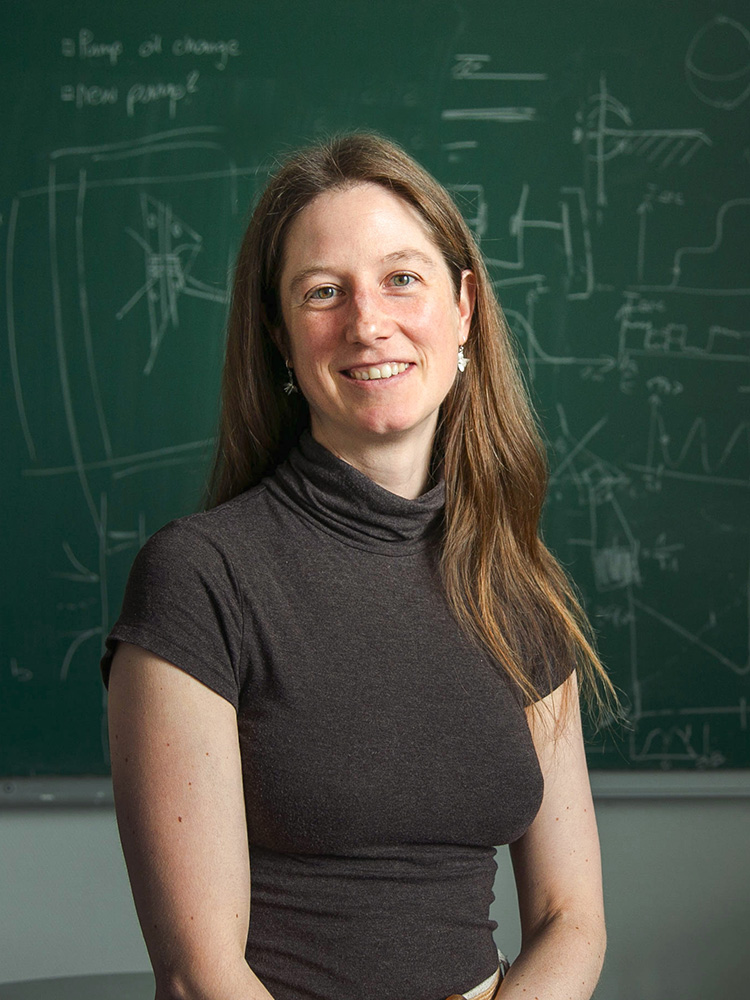Inspired by the intangible.
Text: Irène Dietschi
Despite just two years of physics at high school, Andrea Hofmann chose to study the subject in Zurich. Today, she develops qubits with her research group in Basel.
“So how are we going to do this?” Andrea Hofmann sits expectantly at the conference table in her office at the Department of Physics. The young professor has sacrificed her lunch break for this interview. Since becoming a mother, she has very little free time. And yet she is totally engaged and seems almost electrified. Hofmann is in the fourth year of her tenure-track professorship at the University of Basel. Her field of research is quantum physics: Together with her group, which now has 10 members, she develops qubits — the smallest computing and information unit in a quantum computer.
“We don’t build completed quantum computers here,” Hofmann emphasizes. Instead, the researchers from the Department of Physics develop the physical foundations for these computers of the future. As Hofmann explains, qubits can be produced using various methods and materials. Her group takes three approaches: “One project group works with semiconductor nanostructures, a second group is attempting to couple semiconductors to superconductors, and a third project is experimenting with graphene.” Graphene is an ultrathin material made from carbon, “a kind of wonder material” according to Hofmann. In the right conditions, it is extremely stable and tear-proof, despite consisting of just a single layer of atoms.
As the research-group leader, Hofmann has many administrative and organizational tasks to perform in addition to research. This is why she no longer conducts experiments alone. She discusses the data with her colleagues and advises them on technical structures and the next stage of the experiment. “But I’m no longer personally involved in every measurement,” she says. Her passion for quantum physics remains undimmed, however, as becomes abundantly clear in our short lunchtime meeting. Why does she find this particular topic so fascinating?
Beyond classical physics.
“It’s unexpected,” she replies, “completely different to my previous understanding of the world.” The normal world is tangible and obeys the classic rules of physics. “A ball is either blue or red, regardless of when and how often I look at it.” With its qubits, the quantum world works differently, transcending normal human imagination: “Suddenly something will come along that says, for example, ‘I am neither red nor blue, but now I am red, then I am blue and sometimes I am something in between’.” In other words, a measurement result is not deterministic — determined by preconditions — but random. As a physicist, however, she can manipulate the probability of a certain outcome: “Depending on the time at which a measurement is taken, I can determine whether it is likely to be red or blue or whether the result will be completely random.”
When Hofmann attended school in Eastern Switzerland in the 2000s, there was no indication that she would go on to become a physics professor. She was good at math, but in high school, the math and physics track proved too daunting. “We were told it was very difficult.” And so, as a language enthusiast, she opted for Latin. She studied physics for just two years in high school.
Yet that was all she needed, and after earning her Maturität, her lack of confidence no longer held her back. At ETH Zürich, she quickly caught up with her physics studies, reassured that physics was the world for her. And still it wasn’t always clear that she would pursue the academic path. “My PhD wasn’t always easy, for example,” she says. “There are always setbacks in that line of work. Which may be normal, but you still want to achieve your goal.” As in the marathons she has completed in her free time, giving up has never been an option for her.
Klaus Ensslin, her doctoral supervisor at ETH Zürich, also found her to be highly tenacious: “Before delving into data analysis and theory, Andrea Hofmann optimizes her experiments to obtain measurement data that is as low-noise and informative as possible.” He portrays her as extremely curious, always striving to garner as many details as possible from her measurement results.
After completing her doctorate and postdoc research, Hofmann went on a “visit” to Swiss Re, an insurance company in Zürich. She wanted to see what it was like to work in the corporate sector. Her application for the assistant professorship was still pending at that time.
After four years on the tenure track, she is positive that “this is the job I want!” Obviously, it can be stressful; research doesn’t always run smoothly, and having a young child (her daughter was born in 2023) has added even more pressure. At the same time, she hugely appreciates Basel’s “quantum-heavy environment.” For example, the Department of Physics leads the National Center of Competence in Research that is focusing on the development of a silicon-based quantum computer. “It’s all so amazing and exciting!” she says.
And so she has a message for students who worry that physics is too hard a subject: “Be brave and believe in yourselves! Enjoyment alone is enough of a reason to give it a go.”
Andrea Hofmann comes from Zuzwil in the Canton of St. Gallen. She completed her physics studies at ETH Zürich in 2013 with her master’s, although she wrote her master’s thesis while studying abroad in Santa Barbara, California. Her doctoral dissertation, which she wrote in the group headed by Klaus Ensslin and Thomas Ihn at ETH Zürich, earned her the 2017 ETH Medal and the Metrology Prize awarded by the Swiss Physical Society. After a research stay in Austria and a position as a risk modeler at Swiss Re, in 2021 she was appointed assistant professor with tenure track in the Department of Physics at the University of Basel. Hofmann is married and has one daughter.
More articles in this issue of UNI NOVA (May 2025).

